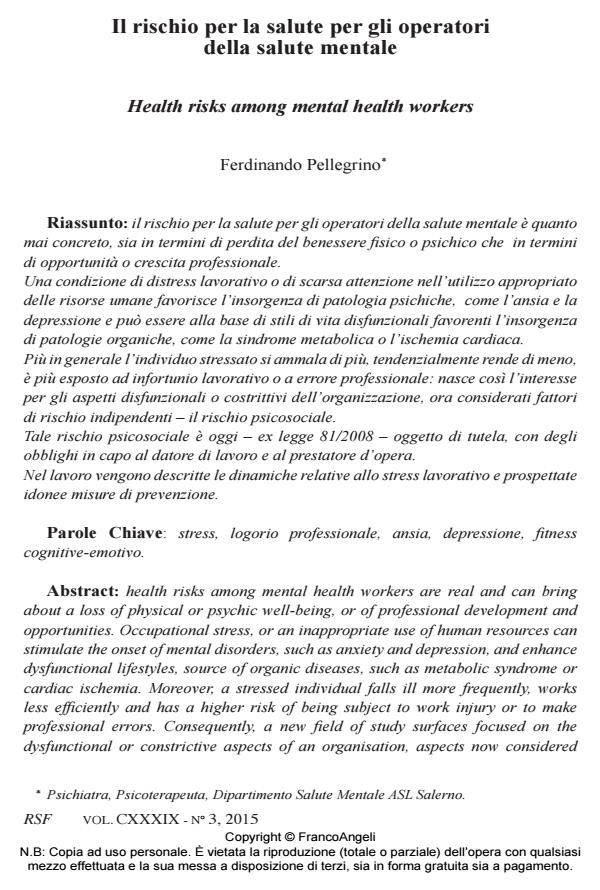Health risks among mental health workers
Journal title RIVISTA SPERIMENTALE DI FRENIATRIA
Author/s Ferdinando Pellegrino
Publishing Year 2015 Issue 2015/3 Language Italian
Pages 15 P. 131-145 File size 2181 KB
DOI 10.3280/RSF2015-003009
DOI is like a bar code for intellectual property: to have more infomation
click here
Below, you can see the article first page
If you want to buy this article in PDF format, you can do it, following the instructions to buy download credits

FrancoAngeli is member of Publishers International Linking Association, Inc (PILA), a not-for-profit association which run the CrossRef service enabling links to and from online scholarly content.
Health risks among mental health workers are real and can bring about a loss of physical or psychic well-being, or of professional development and opportunities. Occupational stress, or an inappropriate use of human resources can stimulate the onset of mental disorders, such as anxiety and depression, and enhance dysfunctional lifestyles, source of organic diseases, such as metabolic syndrome or cardiac ischemia. Moreover, a stressed individual falls ill more frequently, works less efficiently and has a higher risk of being subject to work injury or to make professional errors. Consequently, a new field of study surfaces focused on the dysfunctional or constrictive aspects of an organisation, aspects now considered independent risk factors - psychosocial risks. The law - ex Law 81/2008 - mentions these psychosocial risks and underlines the employer’s and the worker’s obligations. In this article the author describes the dynamics related to occupational stress and suggests appropriate preventive measures.
Keywords: Stress, occupational strain, anxiety, depression, cognitiveemotional fitness
- [1] Powles WE, Ross WD. Psichiatria industriale e occupazionale. In: Arieti S, ed. Manuale di Psichiatria, Boringhieri, Torino,1970.
- [2] Frey BS. Non solo per denaro, le motivazioni disinteressate dell’agire economico. Milano: Bruno Mondadori; 2005.
- [3] Pellegrino F. Oltre lo stress, burn-out o logorio professionale. Torino: Centro Scientifico Editore; 2006.
- [4] Pozzi G. Salute mentale e ambiente di lavoro: nuove competenze per lo Psichiatra. In: Pozzi G. Salute Mentale e ambiente di lavoro. Milano: Franco Angeli; 2008.
- [5] Caputi C. Diabete, per Lei è anche colpa dello stress. “La Salute” di La Repubblica, 3 marzo 2005.
- [6] Rafanelli C, Pancaldi LG, et al. Eventi stressanti e disturbi depressivi quali fattori di rischio per sindrome coronarica acuta. Ital Heart J 2005; 6:105-110.
- [7] Doucet D. La storia del piccolo pinguino che si adattava troppo. Milano: Vallardi; 2013. [8] Trabucchi P. Resisto dunque sono. Milano: Corbaccio; 2007.
- [9] Pellegrino F. Errore e stress lavorativo. M.D. Medicinae Doctor 2006; XIII, 38:10-11.
- [10] Wiseman R. Dov’è il gorilla? Milano: Sonzogno Editore; 2005.
- [11] De Bono E. Il Pensiero Laterale. Milano: BUR; 1969.
- [12] Stoltz P. Response Ability: come i manager continuano a fare bene anche quando le cose vanno male. In: AA.VV. L’Azienda Globale. Milano: Boroli Editore; 2006.
- [13] Maslow AH. Motivazione e personalità. Roma: Armando; 1973.
- [14] Oliviero Ferraris A. Resilienti, La forza è con loro. Psicologia Contemporanea 2003; 180:18-25.
- [15] Goleman D. Lavorare con intelligenza emotiva. Milano: BUR; 2000.
- [16] Miceli M. L’autostima. Bologna: Il Mulino; 1998.
- [17] Csikszentmihalyi M. Se siamo tanto ricchi perché non siamo felici? Bollettino di Psicologia Applicata 2000; XLVII, 232: 3-11.
- [18] Davenport TH. Il mestiere di pensare. Milano: ETAS; 2006.
- [19 Pellegrino F. Personalità ed autoefficacia. Milano: Springer; 2011.
Ferdinando Pellegrino, Il rischio per la salute per gli operatori della salute mentale in "RIVISTA SPERIMENTALE DI FRENIATRIA" 3/2015, pp 131-145, DOI: 10.3280/RSF2015-003009